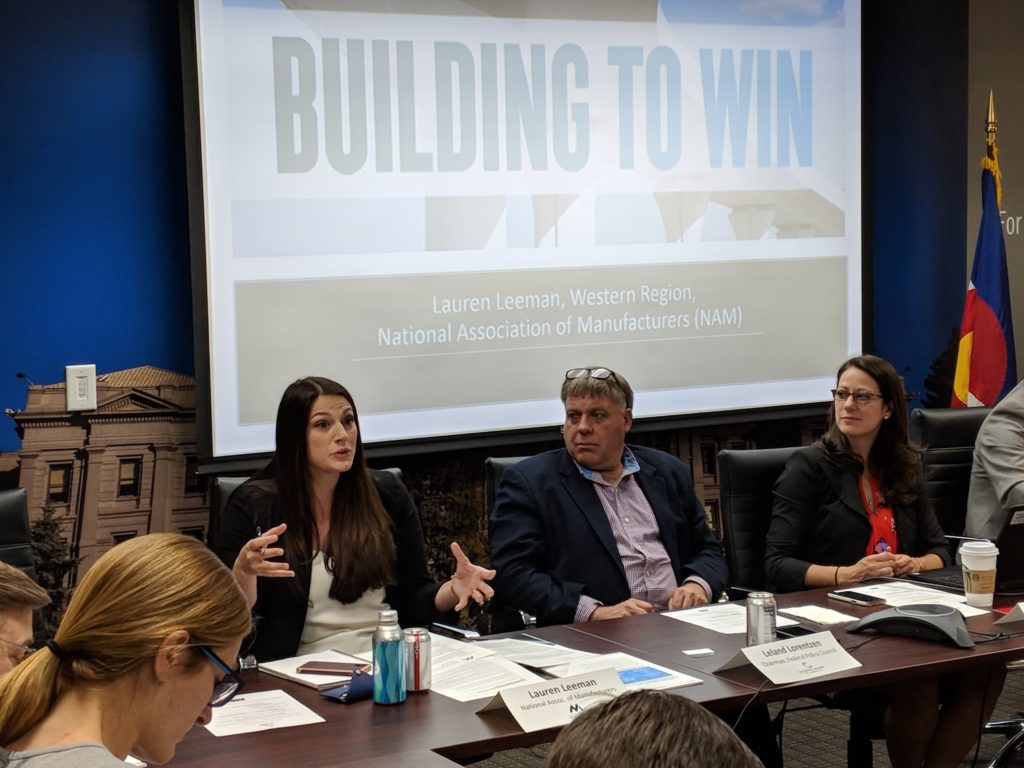In this Capitol Report:
The “Ban the Box” Law: What Does It Mean for Employers?
On May 28th, Governor Jared Polis signed into law HB-1025, the so-called “ban the box” bill that will prohibit employers from asking job applicants on initial applications if they have a criminal history. The measure is entitled the “Colorado Chance to Compete Act.”
Versions of the bill in prior legislative sessions contained a provision (known as a private right-of-action) that would have allowed job applicants to sue an employer for alleged violations of the law if the bill had become law. Because of the provision, the Colorado Chamber opposed those bills.
This session, however, because the introduced version of the bill lacked a private right-of-action provision, the Colorado Chamber adopted a “neutral” position.
The House sponsors of HB-1025 were Democratic Representatives Jovan Melton of Aurora and Leslie Herod of Denver.
How the Act will Affect Employers
What does this new law mean for employers? Below is a detailed explanation of the new law, with additional information that demonstrates how the Colorado Chamber and its business allies successfully worked with the sponsors to amend the introduced bill.
Most importantly for employers, the Act does:
- Not prohibit an employer from asking an applicant if he or she has a criminal history,
- Not bar an employer from running a criminal-history background check, and
- Not allow the applicant to sue the employer for an alleged violation of the Act.
Colorado Joins National Movement
The National Employment Law Project states that 12 states have passed ban-the-box legislation requiring private-sector employers to remove the question from initial job applications: California, Connecticut, Hawaii, Illinois, Massachusetts, Minnesota, New Jersey, New Mexico, Oregon, Rhode Island, Vermont and Washington.
The Colorado criminal history data base contains 1.5 million names, according to the Act, and almost one in three Americans has a criminal record. The Act states that the nation’s Gross Domestic Product (GDP) is reduced by $78 billion to $87 billion annually because ex-offenders cannot find gainful work.
Supporters of the ban the box bills assert that answering in the affirmative a criminal-history question results in an almost automatic rejection by the employer of a job applicant, who then never gets the chance in a face-to-face meeting with the employer to explain his or her criminal history let alone their education, experience and skills.
A representative of the Colorado Center on Law and Policy told the Senate Judiciary Committee that survey of employers found that only 40 percent would give equal consideration to applicants who say they have a criminal history compared to applicants without criminal histories.
Advocates of the bill also said that some on-line job applications are automatically terminated if an applicant checks the box that asks if he or she has a criminal history.
Proponents argue that employment for ex-offenders will decrease recidivism, reduce social-service expenditures on ex-offenders, re-integrate ex-offenders into society and meet the workforce needs of employers, especially in a tight labor market.
Colorado’s History of “Ban the Box” Legislation
In two prior legislative sessions, earlier versions of ban the box legislation were opposed by the Colorado Chamber and died in the Republican-controlled Senate: HB-1305 in 2017 and HB-1388 in 2016.
Both bills contained a provision that barred an employer from asking a job applicant if he or she had a criminal history until the applicant had either been offered an interview or a conditional offer of employment.
Colorado Chamber Position
In general, the Colorado Chamber views the relationship between an employer and a worker to be a private contract and, on principle, usually resists governmental efforts to intrude into the contractual relationship.
Understandably, most employers are extra careful—because of concerns about legal and financial liability and the safety of workers—when it comes to considering the hiring of someone with a criminal history.
Consequently, many employers have traditionally had a question on their initial job applications that ask if an applicant has a criminal history. In answering this question in the affirmative, an applicant with a criminal record would check a box.
At the January 29th hearing on HB-1025 by the House Judiciary Committee, Loren Furman, Colorado Chamber Vice President, State and Federal Policy, told the Committee that the amendments adopted by the Committee that day, which the sponsors had agreed to accept, was a “very measured approach” to amending the legislation to meet the concerns of the business community. Furman told the Committee that she “appreciated the effort” by the sponsors to amend their bill, and she complimented them on their cooperation.
Effective Date of the Act
The effective date for employers with 11 or more workers is September 1, 2019. It delays implementation for employers with ten or fewer workers, however, until September 1, 2021.
Which Employers Are Covered by the Act?
All private-sector employers are covered by the Act.
A bill passed in 2012 by the Colorado legislature prohibits state government hiring managers from asking if an applicant has a criminal history until either the applicant is given a conditional job offer or is a finalist.
What Employers Cannot Do
The Act prohibits private-sector employers from undertaking the following actions:
I) STATE IN AN ADVERTISEMENT FOR AN EMPLOYMENT POSITION THAT A PERSON WITH A CRIMINAL HISTORY MAY NOT APPLY FOR THE POSITION;
(II) STATE ON ANY FORM OF APPLICATION, INCLUDING ELECTRONIC APPLICATIONS, FOR AN EMPLOYMENT POSITION THAT A PERSON WITH A CRIMINAL HISTORY MAY NOT APPLY FOR THE POSITION; OR
(III) INQUIRE INTO, OR REQUIRE DISCLOSURE OF, AN APPLICANT’S CRIMINAL HISTORY ON AN INITIAL WRITTEN OR ELECTRONIC APPLICATION FORM.
(b) AN EMPLOYER MAY OBTAIN THE PUBLICLY AVAILABLE CRIMINAL BACKGROUND REPORT OF AN APPLICANT AT ANY TIME.
Exceptions to the Act
The Act does not apply to the follow job positions being advertised or offered:
- FEDERAL, STATE, OR LOCAL LAW OR REGULATION PROHIBITS EMPLOYING FOR THAT POSITION A PERSON WITH A SPECIFIC CRIMINAL HISTORY;
- THE POSITION IS DESIGNATED BY THE EMPLOYER TO PARTICIPATE IN A FEDERAL, STATE, OR LOCAL GOVERNMENT PROGRAM TO ENCOURAGE THE EMPLOYMENT OF PEOPLE WITH CRIMINAL HISTORIES;
- THE EMPLOYER IS REQUIRED BY FEDERAL, STATE, OR LOCAL LAW OR REGULATION TO CONDUCT A CRIMINAL HISTORY RECORD CHECK FOR THAT POSITION, REGARDLESS OF WHETHER THE POSITION IS FOR AN EMPLOYEE OR AN INDEPENDENT CONTRACTOR.
Prohibiting Job Applicants from Filing Lawsuits Against Employers
The Act explicitly prevents job applicants from pursuing lawsuits against employers for alleged violations of the Act and specifically states that the Act does not create a new “protected class”:
(a) THIS SECTION DOES NOT CREATE OR AUTHORIZE A PRIVATE CAUSE OF ACTION BY A PERSON AGGRIEVED BY A VIOLATION OF THIS SECTION AND DOES NOT CREATE A PROTECTED CLASS UNDER SECTION 24-34-402. THE PENALTIES SET FORTH IN THIS SUBSECTION (5) ARE THE SOLE REMEDY FOR A VIOLATION OF THIS SECTION. THE ISSUANCE OF A WARNING, ORDER, OR PENALTY FOR A VIOLATION OF THIS SECTION IS NOT EVIDENCE OF A VIOLATION OF PART 4 OF ARTICLE 34 OF TITLE 24.
Pursuing a Remedy for a Job Applicant’s Allegation of an Employer’s Violation of the Act
The act provides for a new administrative procedure to be established within the Colorado Department of Labor and Employment (CDLE) to investigate complaints by job applicants about employers who they allege have violated the Act:
(b) A PERSON WHO IS AGGRIEVED BY A VIOLATION OF THIS SECTION MAY FILE A COMPLAINT WITH THE DEPARTMENT. IF THE DEPARTMENT RECEIVES A COMPLAINT WITHIN TWELVE MONTHS AFTER THE ACT THAT IS ALLEGED TO VIOLATE THIS SECTION OCCURRED, THE DEPARTMENT SHALL INVESTIGATE THE COMPLAINT UNLESS THE DEPARTMENT DETERMINES THAT THE COMPLAINT IS WITHOUT MERIT.
Penalties for Employers Found to Violate the Act
Employers found by the CDLE to have violated provisions of the Act will be subject to penalties ranging from a warning to a fine of up to $2,500:
(c) AN EMPLOYER THAT VIOLATES THIS SECTION IS LIABLE FOR ONE OF THE FOLLOWING PENALTIES:
(I) FOR THE FIRST VIOLATION, A WARNING AND AN ORDER REQUIRING COMPLIANCE WITHIN THIRTY DAYS;
(II) FOR THE SECOND VIOLATION, AN ORDER REQUIRING COMPLIANCE WITHIN THIRTY DAYS AND A CIVIL PENALTY NOT TO EXCEED ONE THOUSAND DOLLARS; OR
(IV) FOR A THIRD OR SUBSEQUENT VIOLATION, AN ORDER REQUIRING COMPLIANCE WITHIN THIRTY DAYS AND A CIVIL PENALTY NOT TO EXCEED TWO THOUSAND FIVE HUNDRED DOLLARS.
Educating Employers
With about 1.7 million employers in Colorado, the CDLE faces a major task to educate employers about the Act. The Act appropriates only about $38,000 and 60 percent of one staff member’s time to implement and administer the Act.
Finally, employers may wish to study a document from the U.S. Equal Employment Opportunity Commission: Consideration of Arrest and Conviction Records in Employment Decisions.
More Information
For more information on HB-1025, contact Loren Furman, Colorado Chamber Senior Vice President for State and Federal Relations, at 303.866.9642.
News Media Coverage
For news media coverage of the bill and the issue, read:
“Polis signs trio of bills that business groups, GOP fought as being hurtful to Colorado,” by Ed Sealover, The Denver Business Journal, May 29th.
“Colorado Senate OKs ‘Ban the Box’ bill, sending it to Gov. Polis’ desk,” by Ed Sealover, The Denver Business Journal, April 12th.
“HB-1025, “the Ban the Box” Proposal, Clears First House Committee,” Colorado Chamber Capitol Report, February 1st.
“Business leaders drop opposition to ‘ban the box’ bill as it advances in Colorado Legislature,” by Ed Sealover, The Denver Business Journal, January 30th.
“Colorado Democrats want to ban criminal history questions from job applications,” by Anna Staver, The Denver Post, January 29th.
“Capitol Business Preview: What businesses to know this week at the Colorado Legislature,” by Ed Sealover, The Denver Business Journal, January 28th.
“As ‘ban the box’ spreads, private employers still have questions,” by Tammy LaGorce, The New York Times, November 26, 2017.
“Ban the box initiatives gain momentum,” by Ann Brewer, contributing writer, The Denver Business Journal, June 21, 2017.
The Colorado Chamber Focuses on Infrastructure at Fed Council
This week, the Colorado Chamber hosted special guests from the offices of U.S. Senators Cory Gardner and Michael Bennet, as well as a representative from the National Association of Manufacturers (NAM), to talk about infrastructure in Colorado.
 Delays due to transportation and infrastructure issues can cost manufacturers time and money. Lauren Leeman, Director of Member & Board Relations, Western Region for NAM, discussed the work NAM has done to determine what manufacturers need the most from our critical infrastructure in order to get products to market. NAM, which has the bipartisan support of many members of Congress and the current presidential administration, sees their “Building to Win” blueprint as a starting point for Congress to efficiently and creatively address our nation’s crumbling infrastructure problems.
Delays due to transportation and infrastructure issues can cost manufacturers time and money. Lauren Leeman, Director of Member & Board Relations, Western Region for NAM, discussed the work NAM has done to determine what manufacturers need the most from our critical infrastructure in order to get products to market. NAM, which has the bipartisan support of many members of Congress and the current presidential administration, sees their “Building to Win” blueprint as a starting point for Congress to efficiently and creatively address our nation’s crumbling infrastructure problems.
Julie Duvall, State Director for Sen. Bennet, and Andy Merritt, State Director Sen. Gardner, talked about the ways their teams have worked together to address Colorado’s infrastructure issues. They have gathered input from communities across the state over the past two years to determine what’s most important to Coloradans – from roads, highways and bridges, to airports, water infrastructure and rural broadband.
To learn about future events hosted by the Colorado Chamber, view our upcoming events calendar here.

